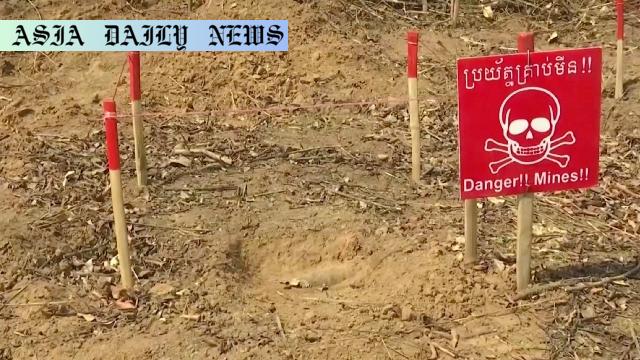landmines: Cambodian demining programs have been suspended for 85 days due to a US foreign aid freeze, threatening humanitarian progress.
- Cambodia’s landmine clearance efforts have stalled due to a US decision to freeze foreign aid for 90 days.
- The 85-day suspension has halted operations in key provinces, endangering humanitarian progress.
- Cambodia relies heavily on the US, which provides $10M annually for mine clearance operations.
- Millions of landmines, remnants of war, continue to threaten lives and livelihoods in Cambodia.

The Impact of US Aid Suspension on Cambodian Landmine Efforts
The recent suspension of US foreign aid has dealt a significant blow to Cambodia’s longstanding efforts to clear landmines, which have plagued the country since its civil war and the Vietnam War. The Cambodian Mine Action Center (CMAC) announced the cessation of demining activities in several provinces following the US decision to freeze foreign aid for 90 days. This pause is set to last for 85 days, according to CMAC’s Director General Heng Ratana.
The Scope of Cambodia’s Landmine Crisis
During its two-decade civil war, Cambodia saw between 4 to 6 million landmines planted across its landscape. Additionally, unexploded ordnance, including bombs dropped by American forces during the Vietnam War, continues to endanger citizens. Landmines and undetonated explosives have caused thousands of deaths and injuries, perpetuating fear and impacting Cambodia’s agriculture and economic development.
US Aid and its Role in Demining
The United States has been a critical partner in Cambodia’s landmine clearance initiatives, contributing approximately $10 million annually. These funds support demining operations vital for safeguarding livelihoods and reconstructing communities in affected regions. Losing this aid heightens the already immense challenges faced by Cambodian authorities and international partners in addressing the landmine epidemic.
Implications of the Aid Freeze
US President Donald Trump’s executive order to halt foreign aid includes a 90-day review period to assess its alignment with the administration’s ‘America First’ agenda. While this policy may aim to prioritize domestic concerns, its ripple effect has jeopardized humanitarian missions abroad, like Cambodia’s demining program. The suspension has forced the temporary shutdown of operations, leaving mine-riddled areas vulnerable and civilians at greater risk.
Cambodia’s Response and Way Forward
Heng Ratana underscored the significance of US assistance in a Facebook post, describing demining as a ‘noble humanitarian mission.’ Cambodian officials are now exploring alternative funding and support channels to sustain their efforts. However, finding reliable, long-term contributors may prove challenging, given the scale of Cambodia’s demining needs.
Landmine Removal as a Humanitarian Imperative
The presence of landmines in Cambodia is not only a safety concern but a moral challenge for the global community. These remnants of war disproportionately affect rural populations, hindering agriculture and local development. Victims of landmine explosions often face long-term physical, emotional, and financial difficulties, further necessitating international cooperation and immediate action.
A Call for Continued International Support
While the US reevaluates its foreign aid priorities, humanitarian organizations and other nations must step up to ensure critical programs like Cambodia’s demining efforts do not collapse. Landmine removal is a global issue that transcends borders and politics, and its resolution requires collective responsibility.
The 85-day suspension of US aid is more than a temporary pause—it serves as a reminder of the fragility of many humanitarian missions and the catastrophic consequences that can unfold when funding is withdrawn. Cambodia’s pursuit of a landmine-free future depends heavily on continued international solidarity and support.



Commentary
The Complexity of Humanitarian Aid and Foreign Policies
The suspension of US foreign aid to Cambodia’s landmine clearance program brings up a larger discussion about the role of international assistance in humanitarian efforts. While it is essential for countries to align foreign aid with their national interests, such decisions must also account for the lives and futures impacted by this funding. Landmine removal in Cambodia is not just an operational task; it’s a global moral responsibility to address the aftermath of past conflicts.
Collateral Consequences of Political Decisions
President Trump’s executive order to review and freeze foreign aid illustrates how domestic political priorities can inadvertently affect vulnerable populations overseas. Cambodia’s reliance on US funding for demining highlights the interconnected nature of global aid programs. This interdependence, however, can be a double-edged sword. When aid is suspended, as seen in Cambodia’s case, entire humanitarian initiatives can come to a sudden halt, leaving communities exposed to harm.
The Need for Diversified Funding Sources
One takeaway from this crisis is the importance of diversifying funding channels for crucial humanitarian programs. Cambodia and other nations relying heavily on one donor must work toward building partnerships with multiple countries and international organizations. Reducing dependency ensures that such efforts are not paralyzed by the policy shifts of a single nation.
Ultimately, moments like this remind us of the value of global solidarity and the shared responsibility to support vulnerable populations. Whether through funding, advocacy, or collaboration, the world must continue to unite in addressing challenges like landmine clearance, which transcend borders and demand our collective commitment.